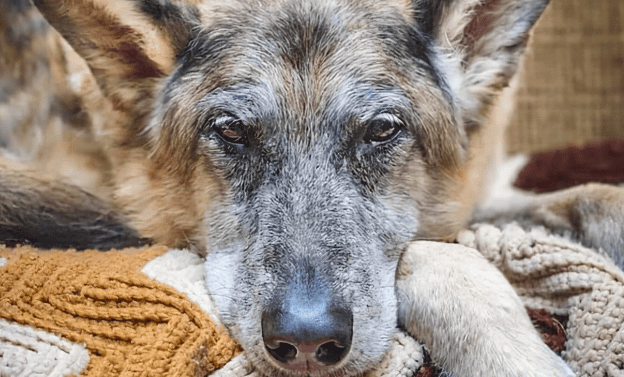Does your dog cry at night? Have you ever noticed that your dog is facing the wrong way in the elevator? Or seem trapped by furniture? Dog starts peeing at home? A trainer can show you how to help an older dog, but these are actually signs of a medical condition.

Medical: The following symptoms belong to cognitive imbalance syndrome
< p>Confusion/Disorientation: Getting lost in a home; changing from facing a door to facing a wall; becoming trapped by furniture or objects behind you and unable to move through them.Overreactive/social behavior; reduced interest in people and other dogs; reduced interest in petting; does not greet you when you come home or makes immediate contact, including not following you around or Sticky.
Activities - increased or repeated: staring at an object, pacing, excessive licking of family members or objects, increased barking, eating faster or more.
Activity - Reduced or apathetic: less exploration, less responsiveness to what is happening around them, less self-grooming, less eating.
Sleep - sleep cycle disorder: day and night are reversed; it is difficult to sleep well at night or is always awake, and sleep increases during the day.
Learning and memory: defecation at home; reduced ability to demonstrate skills; inability to be with lovers or other pets; failure to respond to known commands; reduced ability to learn new skills; reduced use of body language.
If your veterinarian diagnoses your dog with Alzheimer's disease, certain medications, such as Anipryl® (selegilinehydrochloride), may be helpful, including some supplements. Medication combined with behavioral therapy is more effective.
Older dogs are particularly anxious about their owners leaving, as they may have lost hearing or vision.
Behavioral: Reduced ability to cope with change.
Medical: As dogs age, they lose some of their inner senses. "Their vision has decreased, or their hearing is not as sensitive as it used to be. So the information that the dogs used to rely on their senses is missing. Even if the dog's brain is functioning well, there will be a sensory imbalance." Therefore. , elderly dogs will have difficulty coping with changes due to a lack of information acquisition.
If a friendly, non-aggressive senior dog suddenly exhibits unusual aggressive behavior, it is extremely important to identify the cause of the problem, both for the senior dog himself and for the owners and other dogs around him. Both behavioral and medical issues can trigger aggression: Too many older dogs whose aggression suddenly develops without relief end up in shelters.

Behavioral: New stress may make older dogs restless or aggressive. Things like marriage or divorce, the arrival of a newborn or new family member, the death of a loved one, or the arrival of a new pet in the home are all factors that can contribute to aggressive behavior in older dogs. This is due to older dogs’ reduced self-confidence or anxiety and sensitivity as they age.
Medical: Any pain in the body can lead to an attack, from arthritis to toothache. Loss of hearing or vision in older dogs can also make the dog easily frightened, and the inconvenience of movement makes it more difficult for the dog to leave the resource.

 扫一扫微信交流
扫一扫微信交流
发布评论